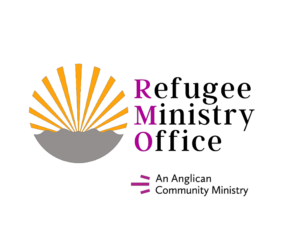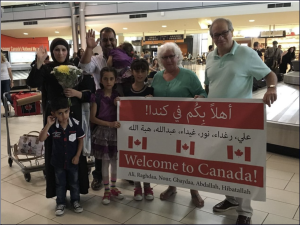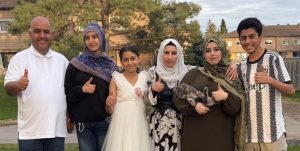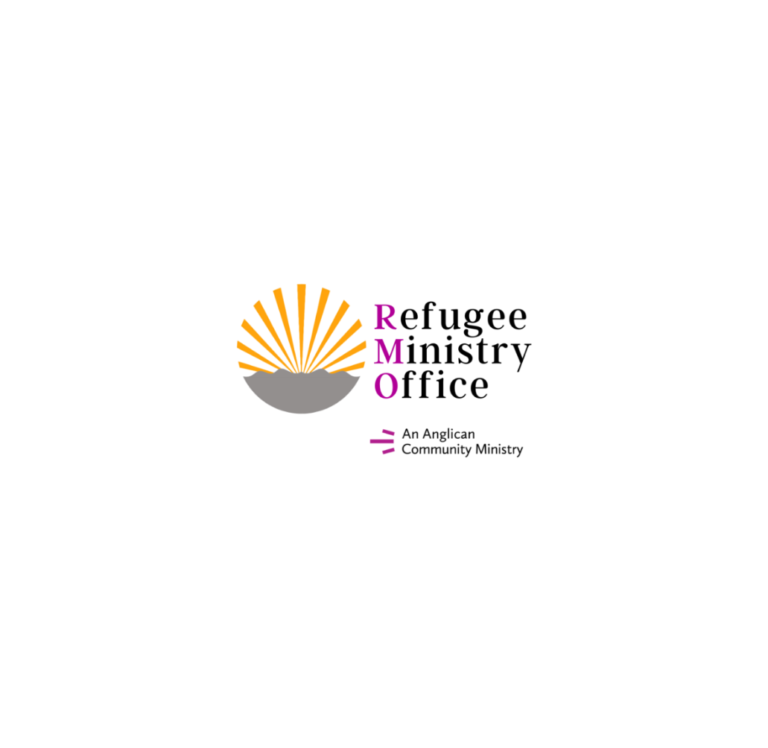New Beginnings brings you news of the settlement of refugees facilitated by the Anglican Diocese of Ottawa through the Refugee Ministry Office. It highlights the successful settlement of refugees, the supporting role of sponsoring groups, helpful hints for settlement and updates from Immigration, Refugees and Citizenship Canada.
new beginnings
REFUGEE MINISTRY OFFICE UPDATES
Summer, 2025 | Subscribe here
Dear Friend,
This issue of New Beginnings aligns with World Refugee Day as designated by the United Nations. It gives us pause to reflect on the broad scope of issues and realities of refugees and those many people and organizations that seek to assist them. On the one hand, it is important to recognize, even celebrate, the global network of organizations and individuals working to bring refugees to safety and provide them with a chance at a new life. On the other hand, the world is such that the need for refugee support grows; it is a crisis.
You will also read about the 2015 Syrian refugee crisis and our local response, good news stories of folks who have been sponsored by the RMO, and the very real challenges faced today, both globally and locally.
As always, thank you for taking the time to read New Beginnings, and please share it with others.
 PJ Hobbs
PJ Hobbs
Director General of Community Ministries
To support the Refugee Ministry Office financially, you can contribute through this link on our website or by writing a cheque to the Refugee Ministry Office, Anglican Diocese of Ottawa, 71 Bronson Ave, Ottawa, ON K1R 6G6. Your contribution would be greatly appreciated.
This issue’s featured stories include:
- World Refugee Day, June 2025
- The 10th anniversary of Operation Syrian Refugee
- The Al Kalouf family from Syria to Lebanon to Ottawa
- The Almdhe Family
- The Worldwide Refugee Challenge Today
- The Refugee Challenge in Canada Today
![]()
World Refugee Day, June 2025
The United Nations General Assembly designated June 20 as World Refugee Day in 2001 to mark the 50th anniversary of the 1951 UN Convention relating to the Status of Refugees.
According to the UN, World Refugee Day is a chance to champion their right to safety, build support for their economic and social inclusion, and advocate for solutions to their unfortunate and often dangerous situations.
The refugees in Ottawa include government sponsored refugees, privately sponsored refugees and asylum seekers.
Here are two ways to celebrate World Refugee Day, suggested by the United Nations:
- Be a friend to refugees in your community
Reach out to refugees in your area. Consider inviting them into your home for dinner, or to spend a few nights in your guest room if they’re in need of somewhere to stay. Introduce them to your local community so they’ll have an easier time getting to know their new neighbourhood. Simply being a friend can make a major positive impact in someone’s life, and serving as a guide to the community can be incredibly helpful.
- Use your job to make a difference
No matter what you do for a living, there’s a good chance that your professional skills can be used to improve the lives of others. Volunteer your work-related talents to local refugee organizations. Last year, the UN shared a goal that someday soon, every refugee would have the opportunity for an education, a safe place to live, and ways to work and contribute to their communities. Chances are, you’ve got a skill or talent that can help in working toward one of those goals. If you own a business or are a hiring manager, you may also consider employing local refugees who are in need of work
To support refugees financially, consider marking this day with a donation to the work of the Refugee Ministry Office. You can contribute through this link on our website or by writing a cheque to the Refugee Ministry Office, Anglican Diocese of Ottawa, 71 Bronson Ave, Ottawa, ON K1R 6G6. Your contribution would be greatly appreciated.
![]()
The 10th anniversary of Operations Syrian Refugee
The effort to resettle Syrians and give them a new life in Canada was triggered as millions fled the Assad government and his reign of terror, beginning in 2011. Today, as the first refugees celebrate 10 years in Canada, more than 100,000 Syrians have made their home here.
The resettlement operation showed Canadians at their best, and leadership by the Anglican church and many other organizations in Ottawa, spurred on by the tragic death of a small boy. As horrified Canadians watched the Syrian crisis unfold in the spring and summer of 2015, people exhorted the government to expedite refugee arrivals. Within the Anglican church, the Primate, Archbishop Fred Hiltz, urged churches across Canada to get involved.
At the same time, local human rights lawyers, Denise Workun and Peter Showler, approached the Anglican Diocese of Ottawa asking if it would expand sponsorship to community groups, not solely parishes. These actions continued as a federal election was called in August and Parliament was prorogued.
In an open letter to political party leaders in August, the Primate wrote, “May your ears and your hearts be open to the call of Canadians for compassion, justice and reason…Our own actions are what give meaning to our words as we share our abundance through greater international assistance, welcome refugees…and work for peace.”
Then, on September 2, 2015, a horrifying photo was published of a Syrian two-year-old, Alan Kurdi. He had drowned and washed ashore in Turkey after a boatload of refugees capsized as they tried to flee to Europe. The Kurdi family had relatives in Canada who desperately sought to sponsor them, to no avail. The picture of the toddler was stark, and the story of his family’s futile efforts for Canadian sponsorship struck home. The tragedy lit a match under Canadians and the election campaign. The Liberals promised to resettle 25,000 Syrians by February 2016.
On September 3, Archbishop Fred Hiltz sent out a Primate’s Call to Prayer and Action, urging churches to donate to world relief funds, to work with other churches and community groups to sponsor refugees, and to write the government for faster and more efficient processes. The Anglican SAHs became umbrella groups in their communities.
In Ottawa, Mayor Jim Watson invited Don Smith, who was the Chair of the Refugee Working Group of the Anglican Diocese of Ottawa, to a meeting to organize an October 1 Town Hall for citizens wishing to help refugees. Don agreed to coordinate with City staff. Hundreds attended.
By early November, when the new Liberal government officially announced Operation Syrian Refugee (OSR), the citizens of Ottawa were ready. Local leaders included the United Way, the Catholic Centre for Immigrants, the University of Ottawa’s Refugee Sponsorship Support Program (providing legal aid for completing applications) and Refugee 613. The latter played a coordinating role as a communications hub and for sponsor training. Jewish Family Services collaborated with the Anglican Diocese SAH to streamline paperwork for a broad range of community and faith-based sponsors.
In December, the Diocese’s first Syrian family arrived under the OSR program. Wejdan Mesto, her husband and her children were sponsored by a new community group in Manotick.
From this first landing on 19 December 2015 to the last Operation Syrian Refugee landing on 24 December 2016, 43 ADO Constituent Groups welcomed 231 newcomers to Ottawa and the surrounding area. Of course, many more newcomers whose applications had been submitted in 2016 landed in subsequent years.
On a national level, Canada resettled more than 44,000 Syrian refugees between fall 2015 and December 31, 2016.
The Anglican Diocese of Ottawa, Refugee 613, the Catholic Centre for Immigrants, the United Way, and the Community Foundation of Ottawa received the Community Builder of the Year Award at a ceremony at City Hall in 2017. The award honoured the local leaders at the epicentre of the overwhelming outpouring of support from thousands of Ottawa citizens who worked collectively, aligning their expertise and resources to put in place the supports needed to help Syrian refugees find peace and hope in a new place.
![]()
The Al Kalouf family from Syria to Lebanon to Ottawa
By: Ann Hustis, Our Syrian Family Ottawa
In 2015, Canadians were shaken by the heartbreaking image of two-year-old Alan Kurdi’s lifeless body on a Mediterranean beach. He and his family had fled war-torn Syria, attempting to reach Europe from Turkey, in hopes of eventually coming to Canada. This moment galvanized many Canadians to take action.

My husband, Nick Assad, and I spoke with our family and friends in Ottawa and immediately formed a constituent sponsorship group called Our Syrian Family Ottawa under the Anglican Diocese of Ottawa. Over 30 volunteers joined us, taking on key responsibilities including schooling, medical care, housing, furniture, clothing, and more. The group was co-chaired by Ann Hustis and Mary Browne.
Recognizing the need for financial support, we organized a “FUN-Raising Auction” on June 17, 2016. This event raised more than $33,000. The most notable auction item was a dinner for six at the home of former Prime Minister Jean Chrétien and his wife Aline!
A Canadian Lebanese friend, Mehana Khaddage, an Ottawa taxi driver, knew of four Syrian families living in his hometown of Aabey, Lebanon. He recommended that we sponsor the Al Katouf family of six first. Mehana spoke both Arabic and English, which was essential. Using WhatsApp, Ann relayed questions to Mehana, who then gathered answers directly from Ali Al Katouf. The time zone differences worked well because Mehana often worked late into the night.
After five months of processing by IRCC, the Al Katouf family arrived in Ottawa on July 14, 2016. They were warmly welcomed at the Ottawa airport by several volunteers. From day one, our volunteers sprang into action. Since it was summer, the children wouldn’t start school until September, but the ever-welcoming Family Reception Centre ensured they were tested and registered early. We secured a three-bedroom townhome for them at Accora Village in the Bayshore area, an exceptional community where we’ve since resettled many other families. The parents began attending ESL classes at the nearby Bayshore School, and fortunately, the two older daughters, Nour and Ghaydaa, already spoke some English.
The Al Katouf family adapted to life in Ottawa remarkably well. The children attended Bayshore Public School, just a five-minute walk from home. Ali and his wife Raghdaa continued ESL classes while also managing the household. Ali worked several part-time jobs, and the children enrolled in Saturday Arabic school to retain their language and cultural identity.
About five years ago, Raghdaa began working at a McDonald’s restaurant and has since earned several promotions. This job significantly improved her English. Four years ago, she added a part-time role at a ghost kitchen, preparing Arabic food. Now, she’s considering launching her own catering business, and Nick and Ann are helping her explore commercial kitchen rental options. Ali continues to manage the home and volunteers to help newcomers, especially those settling in Accora Village.

Nour has just completed her first year of a Bachelor of Science in Biology at Carleton University. Ghaydaa is finishing Grade 11 at Bell High School, Abdullah is completing Grade 8 there, and Hiba is wrapping up Grade 6 at Bayshore Public School, soon to join her siblings at Bell. It will be bittersweet to say goodbye to Bayshore Public School.
In 2024, the Al Katouf family proudly received their Canadian citizenship and passports. Since then, Ali has travelled twice to Cuba with the fathers of our other sponsored Syrian families.
Two months after the Al Katouf family’s arrival, in September 2016, we welcomed the Hasan family of five. In December 2017, the Al Mostafa family of seven arrived, and finally, in October 2020, the Dandal family of six joined us. All four families, originally from the town of Kastun, Syria, then refugees in Aabey, Lebanon, were now reunited in Ottawa’s Accora Village. What a joy to see them together again!
Now, ten years after the height of the Syrian refugee crisis, life has moved on, but our friendship with these families remains strong. We continue to visit Ali and Raghdaa every few weeks, sharing dinners at their home or ours. Together, we celebrate both Muslim and Christian holidays and birthdays, deepening the bond that has grown between our families over the years.
![]()
The Almdhe Family
The Almdhe family from Syria, sponsored by Perth’s Community Alliance for Refugee Resettlement (CARR), flew into an Ottawa snowstorm in February 2016. The roads between Perth and Ottawa were closed. The Almdhe welcome team could not meet them at the airport.
A phone call to Don and Thérése Smith provided a solution. They immediately changed their plans for the day and headed to the airport, welcoming the family of five into their home. The Smith’s car, plus a taxi van ferried the family and their luggage to the top of the Smith’s Street. The adults dragged the luggage through the snow drifts while three young children trudged behind. The warm winter clothing and boots provided by the government were put to good use.
Thérèse cooked up a big batch of halal pea soup, then everyone crashed for the night. The next morning, the sun was shining. The children had their first experience sledding on snow drifts and then walked over to the canal, learning that people have fun in the winter. Highway 7 was reopened. The CARR welcome team made the journey to Ottawa to pick them up.
Fast forward to spring 2025. All family members have learned English. They are Canadian citizens. After several unsuccessful attempts to find work, Ahmad was hired at a local factory, only to be laid off during COVID. Ahmad completed his Ontario Secondary School Diploma and studied to become a barber. It is an in-demand transferable occupation. He opened his own shop in Perth. Being an entrepreneur has given him more freedom, the ability to make his own decisions, gained him respect as a businessman, plus sufficient money to support his family, which now includes five children. Ahmad has returned to visit family in Syria twice in the last five years, with the entire family making the journey once. They are proud homeowners.

Kafaa’s goal is for her children to be safe and happy, have a decent life and a good education. She has grown in confidence from a woman who would not go outside the house unescorted, to driving her car and taking their children where they need to go. In between her time as a supermom, she works in Ahmad’s barbershop, ordering supplies and keeping it clean.
The Almdhe family is an excellent example of new Canadians adding to the rich history and culture that is Canada. In February 2016, amid a fierce Ottawa snowstorm, the Almdhe family from Syria arrived in Canada, sponsored by Perth’s Community Alliance for Refugee Resettlement (CARR). Closed roads prevented the CARR welcome team from reaching the airport. That’s when Don and Thérèse Smith stepped in.
Without hesitation, the Smiths changed their plans, drove to Ottawa, and welcomed the family of five into their home. The journey ended with a snowy walk up their street, children bundled in warm winter clothes, dragging suitcases through deep drifts. Thérèse had halal pea soup ready, and the next morning, the children experienced sledding and winter fun for the first time.
Fast forward to Spring 2025: the Almdhe family is thriving. All are now Canadian citizens. Ahmad, after being laid off during COVID, earned his high school diploma and became a barber. Today, he owns a barbershop in Perth, supporting his family, which now includes five children.
Kafaa, once hesitant to leave home alone, now drives confidently and helps run the shop, balancing her role as a mother and community member with grace.
The Almdhes’ story is a testament to the strength of newcomers—and the power of a compassionate welcome. Their journey enriches our community and reminds us of what’s possible when we come together.
![]()
The Worldwide Refugee Challenge Today
The numbers keep growing
As of the end of June 2024, there were an estimated 122.6 million people around the world who had been forced to flee their homes. Among them are nearly 43.7 million refugees.
There are also 4.4 million stateless people, who have been denied a nationality and lack access to basic rights such as education, health care, employment and freedom of movement. These include the children born to refugees in countries that do not grant them citizenship.
More than 2.9 million refugees worldwide will need resettlement in 2025, an increase of 20 per cent compared to 2024, according to the Projected Global Resettlement Report issued by the UNCHR, the UN Refugee Agency. The refugees’ lives are at risk in the countries they have fled to.
“The increase in resettlement needs is also occurring at a time of difficult economic conditions globally, resulting in rising living costs and declining humanitarian aid”, the UNCHR report cautioned. “Growing xenophobia and discrimination are also exposing refugees to heightened risks of deportation, violence, exploitation and other human rights violations, while the impact of climate change and environmental disasters are also exacerbating refugees’ pre-existing vulnerabilities.”
The United Nation forecast is based on the prolongation of mass displacement situations, the emergence of new conflicts and the impacts of climate change. The predictions were made before Donald’s Trump’s re-election as the President of the United States in November 2024. Since Mr. Trump took office, the US has essentially closed its doors to all refugees except recently welcoming white South Africans it determined (falsely) were at risk of genocide. The current talk of worldwide recession and budget cuts at the UNCHR was not foreseen.
The UN Refugee Agency warned in March 2025 that the drastic cuts in US foreign aid will endanger millions of lives and force it to “significantly reduce” its staff due to the lack of American funding. The United States is UNHCR’s largest donor, contributing about 40 percent of its budget. As of September 2024, the agency had nearly 20,000 employees.
As the global need for resettlement reaches a record high, the amount of resettlement spaces and resources to assist refugees is shrinking. This is in part due to the struggle for governments to balance humanitarian obligations with practical issues impacting all citizens, such as housing shortages. It is also driven by the growth of right-wing, anti-immigrant sentiment in the Western world.
![]()
The Refugee Challenge in Canada Today
Strained public service capacity and a shortage of affordable housing are driving reductions in immigration targets, including refugee places.
There are fewer places for UNCHR refugees in Canada today because of policies intended to address the severe strains on housing and rental markets and public services such as health care.
The housing shortages and overburdened public services are a result in part of increased immigration. To alleviate these pressures, most categories of immigration to Canada for 2025-27 have been reduced, including the number of foreign students and temporary workers. Canada has welcomed significant numbers of refugees and displaced people in recent years. Among these are 50,000 Afghan and 100,000 Syrian refugees, as well as over 300,000 Ukrainians under special visas.
The annual target for Government-Assisted Refugees (GARs) continues at 15,250, but the Privately Sponsored Refugee category (PSR) has dropped from 27,750 in 2024 to 23,000 in 202,5 with further reductions planned to 22,000 in 2026 and 21,000 in 2027.
The Anglican Diocese of Ottawa submitted applications for 111 regular privately sponsored refugees (i.e., not Blended Visa Office Referred or Rainbow RAP refugees) in 2024, but its allocation for 2025 has been reduced to 78 individuals in 2025. This number may be revised later in the year if other SAHs return unused spaces to the reserve pool.
Asylum seekers expected to increase
In addition to refugees, Canada received approximately 140,000 asylum claims in 2023, a 128% year-over-year increase. Asylum seekers present themselves to a CBSA officer at the border or airport or to an immigration officer at an IRCC office to initiate a refugee claim.
In past years, the Immigration and Refugee Board (IRB) had the capacity to process only 50,000 asylum claims annually, leading to a backlog of more than 270,000 cases by year-end 2024. This meant asylum seekers might live in Canada for four years or longer, waiting for their cases to be heard. Last year 80% of the cases heard were accepted as refugees and allowed to make their permanent home here.
A further increase in asylum seekers is expected due to recent American immigration policies. The new Trump government has suspended its refugee resettlement program except on a case-by case basis. The US is also cracking down and deporting undocumented residents, which may cause larger numbers to head for Canada rather than be deported to the countries they have fled from. But faster processes are reducing case backlogs here. With a focus on speeding asylum cases, Canada “processed” 28,800 Asylum seekers in the first three months of 2025, according to IRCC.
How this affects the newcomers we welcome
Long wait times are the first difficulty for PSR refugees sponsored to resettle in Canada.
At the beginning of the year, IRCC had applications for about 80,000 PSRs in their inventory either in Ottawa or overseas. The total target landing target for PSRs in the 2025 Immigration Levels Plan is 23,000 + 22,000 + 21,000 = 66,000 for 2025 through 2027. That means IRCC will not clear the inventory over the next 3 years, let alone land any of the applications going in this year. Or in other words, an application going in this year may not land for the next 4 or 5 years.
The climate for settling refugees in Canada has become very difficult, with a lack of resources that once helped newcomers settle into new homes and thrive. The challenge of finding and affording adequate housing is immense. Finding family doctors for newcomers is nearly impossible, while ESL classes have long waitlists. Meanwhile, entry-level jobs that were available to refugees in past years have been swamped by international students who have come to Canada in record numbers with the language skills that many refugees lack. All factors make it more difficult for sponsors to set refugees up in a sustainable existence geared towards independence.
About the Refugee Ministry Office (RMO):The mission of the RMO is to collaborate with community partners to bring refugees to safety in Canada, supporting them to become confident members of our society. We review and file refugee applications, provide guidance to our community partners, and monitor the experience of refugees in their first year in Canada. In addition, we advocate for individual refugee cases and with others seek to reduce barriers to refugee sponsorship. This is a ministry that is shared among many people, involving parishes, community groups, family members, and a key partnership with the Government of Canada. Learn more about the ADO Refugee Ministry Office. |
Related Articles
November 21, 2024
New beginnings: RMO Updates Newsletter 2024 - December
March 5, 2025
